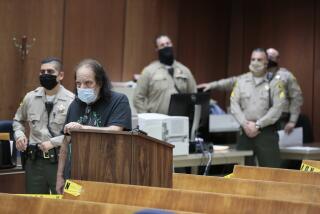Judge rules that spouse has authority to remove partner’s life support if there’s no directive
- Share via
A Los Angeles judge has ruled that a spouse in California is the presumptive healthcare decision maker when the partner is in a persistent vegetative state.
Ruling in the case of a San Gabriel Valley man, Los Angeles Superior Court Judge Mary Thornton House said that in the event that there is no advance directive for someone in a vegetative state, their partner can decide for them. California law, House noted in her ruling, has left “a gap” when it comes to this issue.
The case involves Juan Fernando Romero, who suffered a lack of oxygen to the brain in May 2015 that left him in a persistent vegetative state at a San Gabriel Valley hospital.
His wife, Ana Romero, in 2016 sought to remove his life support and feeding tube, saying he would never return from the vegetative state again. But his sister sued to gain control of the end-of-life decision from his wife.
The sister’s attorneys argued in legal papers the wife did not have the right to make the decision under the law and lawmakers in setting out the law had emphasized family consensus. Her attorneys argued that her brother did not want to die and it was against his Roman Catholic belief that life is sacred.
But House ruled the wife did have the right to make the decision for the father of their two young children, who is unresponsive to physical and psychological stimuli. “As his spouse, Ana is the presumptive healthcare surrogate for Juan Fernando in light of his incapacitation,” House wrote.
The case is reminiscent of the Terri Schiavo case in Florida in which her husband sought to disconnect life support and her parents fought him for years in the courts in a highly publicized and prolonged series of legal challenges.
In the Romero case, the judge noted that Juan Fernando Romero had discussed with his wife the issue of not prolonging death. “Not one member of Juan Fernando’s immediate family (mother, father, sisters) ever discussed with him what his wishes were if he was in a permanent vegetative state, bedridden, and unable to recover or communicate,” House noted of the testimony.
His brain function, she added, was limited to subcortical and that he would never recover.
While his family insisted he was still able to give them signs including a kiss, House, based on expert testimony, found otherwise. “As a result of the overwhelming evidence that Juan Fernando is incapable of any kind of conscious response, [his sister] Lilian’s beliefs that her brother is aware of her and communicating with her are mistaken.”
House, while noting that state laws have left a gap in describing the order of who makes decisions for an unconscious patient, ruled that case law showed that Ana Romero’s decision making as her husband’s surrogate was in full compliance with the state’s Health Care Decisions Law.
Six months into the legal fight, Juan Fernando Romero died last summer. But because of the larger legal issue, the case continued. House in her ruling noted that the case reflected issues of “continuing public importance.”
“I am thankful for the judge’s ruling validating my judgment to follow my husband’s preferences for end-of-life care after doctors said he would not recover,” Ana Romero said in a statement. But she added the litigation “prevented me from honoring my husband’s preferences for his end-of-life care, so he needlessly lingered for another six months before he died.”
Attorneys for Romero’s sister at the Life Legal Defense Foundation did not return telephone calls for comment on the ruling.
The case, attorneys for Ana Romero said, illustrates the need for advance directives in California. The case also evolved into a struggle of politics, with “right to life” legal counsel for his relatives and liberal legal activists for his wife.
“Ana Romero could have decided to drop this case after her husband died to focus on her role as a single mother of their two young children and sole family breadwinner,” said Jonathan Patterson, one of her lawyers and staff attorney for Compassion & Choices, an end-of-life care advocacy group. “But she bravely battled on to ensure Fernando’s tragedy served a greater purpose to benefit others, by discouraging similar lawsuits that only cause pain and suffering for everyone involved.”
Twitter: @lacrimes
More to Read
Sign up for Essential California
The most important California stories and recommendations in your inbox every morning.
You may occasionally receive promotional content from the Los Angeles Times.














